Minister of Justice Highlights Priorities for Strengthening the Judicial System in the Ninth Edition of “Página do Governo” - Friday at 8 p.m. on RTTL
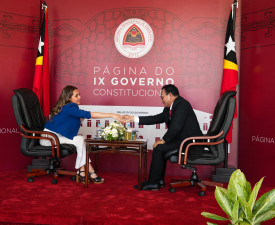
The Minister of Justice, Sérgio de Jesus Fernandes da Costa Hornai, presents the Ministry of Justice's main priorities and strategies for strengthening the national judicial system, in the ninth edition of the “Página do Governo” program, which will be broadcast next Friday, July 25th, 2025, at 8pm, on Radio and Television of Timor-Leste (RTTL Portuguese acronyms) and on digital platforms. 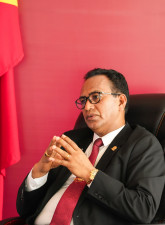
During the interview, the Minister stressed that institutional strengthening and the promotion of trust in the justice system are central objectives of the 9th Constitutional Government, in line with the Strategic Development Plan 2011-2030. Sérgio Hornai says that “the 9th Constitutional Government came with a key program: how to establish and carry out institutional strengthening, especially so that judicial institutions can function effectively, become more transparent, in order to promote justice for our citizens”. He adds that “we really need justice that brings confidence, both in terms of administrative justice and justice related to litigation” and that the aim is “to do our work efficiently, effectively, and in such a way that we can give an answer to our community, especially our citizens, so that they can access formal justice”. 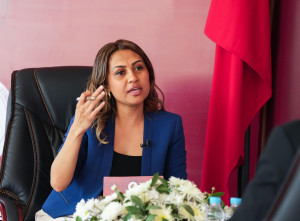
Sérgio Hornai stresses that identifying and correcting weaknesses are fundamental steps towards strengthening citizens' trust in state institutions. “First of all, we have to find out what the weaknesses are, which already come from previous governments, so that we can correct these weaknesses that we face,” he says, adding that the government will “make every effort to strengthen the institutions, so that they can be responsible and provide an inclusive service to our citizens, so that citizens can strengthen their trust in state institutions.”
Regarding access to justice, Sérgio Hornai points out that “the government has made it a strong priority to decentralize political power down to the grassroots” by implementing “a policy of expanding the administrative sector and the judicial sector down to the communities, especially so that people can have accessible, efficient, effective and low-cost access”. He also points out that “we have started to open the one-stop shop to our communities, so that it is more accessible in terms of registering their interests”. 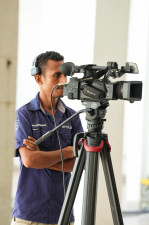
Regarding the strengthening of criminal investigation, the Minister stressed the strategic importance of the Scientific Criminal Investigation Police (PCIC Portuguese acronyms), which he considers “very important as a criminal police body that assists the judicial authorities in investigating crimes of great complexity and transnational crimes”. He stressed that it is necessary to “give great priority to the issue of equipment that can support the activities of the Criminal Investigation Police, especially in the forensic area” and that the government wants to “develop a policy that leads us to have a consolidated investigation police force, with the capacity and legitimacy to implement the Criminal Investigation Organization Law that the government has already produced”, while ensuring “that there is no overlap of functions between the various criminal police bodies”. 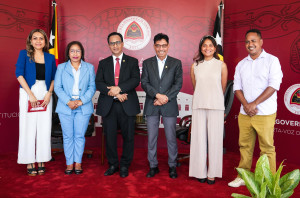
International cooperation and strengthening the training of justice operators were also highlighted as priorities. Sérgio Hornai says that “we currently have a strong partnership through the strategic cooperation plan between Portugal and Timor-Leste for institutional strengthening in the justice sector” and that the government wants to “develop a partnership to improve the knowledge of our justice operators, especially judges, prosecutors, defenders, criminal police bodies, as well as bailiffs”. He also stressed that “we are also cooperating with other countries in the area of criminal investigation, namely Australia, Indonesia and others, to see how we can improve the quality of our services”.
As part of the fight against corruption, the Minister recalled that “the Anti-Corruption Commission is a state body, a state institution that oversees policies, prevention measures and also the promotion of criminal investigations to combat corruption crimes”. He emphasizes the strengthening of the “partnership between the PCIC and the Anti-Corruption Commission”, with the aim of strengthening “prevention measures, maintaining a permanent dialogue, carrying out continuous dissemination campaigns, in order to strengthen our public institutions, to strengthen state institutions”. 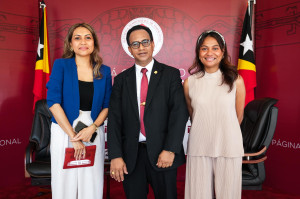
The interview also addresses gender equality as a transversal priority. Sérgio Hornai argues that “we need to raise awareness across the board, among everyone, so that we can say without a doubt that any form of discrimination or marginalization of women is unacceptable”. She stresses that “the government is emphasizing this approach, so that women can be included, can have the priority they deserve, and can exercise their rights in relation to previous situations or circumstances”. It adds that “we are making great efforts to carry out awareness-raising actions and dissemination campaigns in our communities, so that they are more sensitive to the situation of women”.
In line with the 2030 Agenda, the Minister states that “the strategies [underway] have to do with the policy of strengthening, of developing a sector that respects human rights, of a more accessible justice system, of a justice system that responds to human rights, of a justice system that responds to formal justice and social justice”. He adds that “we want to join this vision or political approach, to create a Timor-Leste that respects democracy, strengthens democracy, strengthens the rule of law and can bring confidence or justice to the community”, stressing that “the requirement of this general vision is to strengthen a democratic rule of law, a rule of law that does justice on behalf of the people, in accordance with the Constitution, that does justice independently, that does justice impartially”.
Lastly, Sérgio Hornai presented the long-term vision for the justice sector, saying that it involves investment in human resources. “We want professional human resources, capable human resources, who have the capacity and high levels of knowledge, and who also have the capacity to absorb, to have more knowledge, to be able to develop justice with objectivity, impartiality,” he said.
The “Página do Governo” program is a joint initiative of the Government Spokesperson's Office, led by the Minister for the Presidency of the Council of Ministers, Agio Pereira, RTTL, the national media and digital platforms, with the aim of strengthening government transparency and guaranteeing public access to information on the Executive's main actions and decisions.
With Nélia Chaves as presenter and Ika Moniz as executive producer, the program has the technical support of the communications teams of the Prime Minister's Office, the Presidency of the Council of Ministers and the office of the members of government interviewed.
The Government’s Spokesperson, Minister Agio Pereira, reiterates that the ‘Página do Governo’ is an important instrument for promoting accountability and dialogue between the Executive and citizens”.
The Government invites all citizens to follow this edition of “Página do Governo”, which will be broadcast on Friday, July 25th, 2025, at 8 p.m., via RTTL and social media, contributing to a more informed, participatory society committed to the development of Timor-Leste.
To watch the previous episodes of “Página do Governo” already broadcast, click on the following links:
1. Minister of Public Works, Samuel Marçal- https://www.youtube.com/watch?v=YzgPqD0tU7c
2. Minister of State Administration, Tomás do Rosário Cabral - https://www.youtube.com/watch?v=SSSO60y0Bjw
3. Minister of Planning and Strategic Investment, Gastão Francisco de Sousa - https://www.youtube.com/watch?v=hooyotfMkrk
4. Minister for Foreign Affairs and Cooperation, Bendito dos Santos Freitas - https://www.youtube.com/watch?v=PIp8kTaXUAA
5. Vice Prime-Minister, Coordinating Minister for Social Affairs and Minister for Rural Development and Community Housing, Mariano Assanami Sabino - https://www.youtube.com/watch?v=rYMdrKwizLE
6. Secretary of State for Toponymy and Urban Organization, Germano Santa Brites Dias - https://www.youtube.com/watch?v=wvQwW5JSaYo&t=24s
7. Vice Prime-Minister, Coordinating Minister for Economic Affairs and Minister for Tourism and the Environment, Francisco Kalbuady Lay - https://www.youtube.com/watch?v=okLlr6vGwdM
8. Cristovão Secretary of State for Art and Culture, Jorge Soares Cristovão - https://youtu.be/HS8F9gPG5wA?list=PLkXWxGdMgvb3K6VPWQClTxLcPFxH5HypV










































